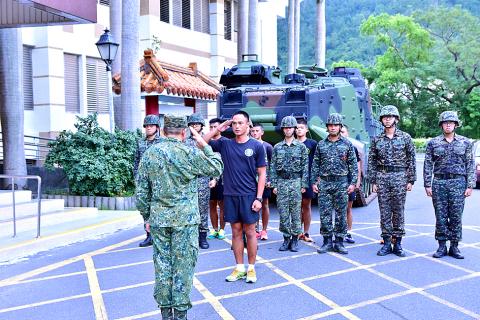Draft amendments to the pension system for military personnel would emulate the US military’s retirement program, the Presidential Office’s Pension Reform Committee said yesterday.
After discussions with the Ministry of National Defense, the committee has decided that military personnel would have a higher income replacement ratio for their pensions than civil servants and teachers, the committee said.
The proposed pension program would emulate the “Final Pay” retirement system used by the US military, which would multiply final monthly base pay by 2.5 percent for every year of service, the committee said.

Photo: Chang Yi-chen, Taipei Times
Personnel who have served 20 years in the armed forces would be entitled to 50 percent of their base pay, while those who have served 40 years would receive 100 percent of their base pay, it said.
Committee members said military personnel would not receive special treatment and would be treated the same as civil servants and teachers in terms of the 18 percent preferential savings rate.
The 18 percent preferential interest rate is to be phased out in six years, in accordance with amendments passed in June to the Act Governing Civil Servants’ Retirement, Discharge and Pensions (公務人員退休資遣撫卹法), the Act Governing the Retirement of Public-School Teachers and Employees (公立學校教職員退休資遣撫卹條例) and the Act Governing the Recompense for the Discharge of Special Political Appointees (政務人員退職撫卹條例).
On July 1 next year, the 18 percent preferential savings rate would initially be decreased to 9 percent before it is phased out completely by Jan. 1, 2021.
The draft amendments have received tacit consent from the president and the final version would be sent to the Legislative Yuan after the ministry makes final adjustments to plans for active personnel with secondary skill sets, the committee said.
The committee said it is satisfied with the Vocational Assistance Commission for Retired Servicemen’s plans to help with the education of retired personnel.
The planning phase of the amendments has been completed and it would not be difficult for the drafts to be considered by the Legislative Yuan before the end of the year, committee members said, adding that emulating the US retirement system would provide a generous pension plan for retired military personnel.

SECURITY: As China is ‘reshaping’ Hong Kong’s population, Taiwan must raise the eligibility threshold for applications from Hong Kongers, Chiu Chui-cheng said When Hong Kong and Macau citizens apply for residency in Taiwan, it would be under a new category that includes a “national security observation period,” Mainland Affairs Council (MAC) Minister Chiu Chui-cheng (邱垂正) said yesterday. President William Lai (賴清德) on March 13 announced 17 strategies to counter China’s aggression toward Taiwan, including incorporating national security considerations into the review process for residency applications from Hong Kong and Macau citizens. The situation in Hong Kong is constantly changing, Chiu said to media yesterday on the sidelines of the Taipei Technology Run hosted by the Taipei Neihu Technology Park Development Association. With

CARROT AND STICK: While unrelenting in its military threats, China attracted nearly 40,000 Taiwanese to over 400 business events last year Nearly 40,000 Taiwanese last year joined industry events in China, such as conferences and trade fairs, supported by the Chinese government, a study showed yesterday, as Beijing ramps up a charm offensive toward Taipei alongside military pressure. China has long taken a carrot-and-stick approach to Taiwan, threatening it with the prospect of military action while reaching out to those it believes are amenable to Beijing’s point of view. Taiwanese security officials are wary of what they see as Beijing’s influence campaigns to sway public opinion after Taipei and Beijing gradually resumed travel links halted by the COVID-19 pandemic, but the scale of

A US Marine Corps regiment equipped with Naval Strike Missiles (NSM) is set to participate in the upcoming Balikatan 25 exercise in the Luzon Strait, marking the system’s first-ever deployment in the Philippines. US and Philippine officials have separately confirmed that the Navy Marine Expeditionary Ship Interdiction System (NMESIS) — the mobile launch platform for the Naval Strike Missile — would take part in the joint exercise. The missiles are being deployed to “a strategic first island chain chokepoint” in the waters between Taiwan proper and the Philippines, US-based Naval News reported. “The Luzon Strait and Bashi Channel represent a critical access

Pope Francis is be laid to rest on Saturday after lying in state for three days in St Peter’s Basilica, where the faithful are expected to flock to pay their respects to history’s first Latin American pontiff. The cardinals met yesterday in the Vatican’s synod hall to chart the next steps before a conclave begins to choose Francis’ successor, as condolences poured in from around the world. According to current norms, the conclave must begin between May 5 and 10. The cardinals set the funeral for Saturday at 10am in St Peter’s Square, to be celebrated by the dean of the College